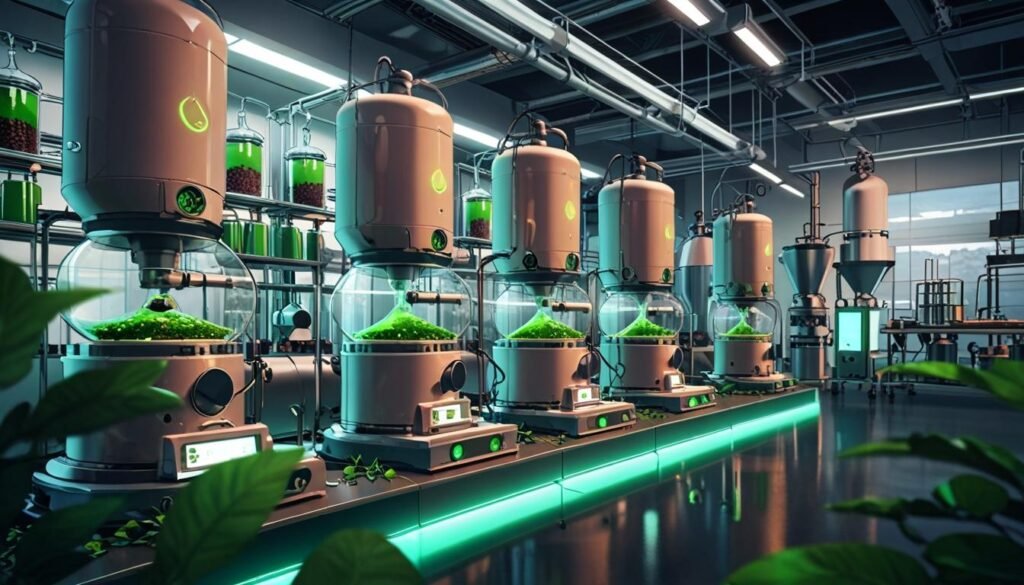**Singapore**: A local company is set to transform coffee production using plant cell culture technology, increasing harvest speed twentyfold and boosting supply resilience without genetic modification, while aiming to expand across Asia and improve sustainability in the face of climate challenges.
A Singapore-based firm is pioneering the use of plant cell culture technology to revolutionise coffee production, promising a significant reduction in the harvest cycle and enhanced supply resilience. The company aims to produce coffee harvests every 14 days, a rate approximately 20 times faster than traditional coffee farming methods.
CEO Stéphane Chen outlined the firm’s ambitions, emphasising the potential scale of production. “A small coffee farm typically produces around 800 kilograms of coffee per year. Using our technology, we could scale up to 15 to 20 tonnes annually,” he told FoodNavigator-Asia.com. This forecast indicates a dramatic increase in output capacity through innovative cultivation techniques.
The company’s approach involves cultivating coffee cells in controlled environments without the use of genetic modification. Their proprietary process begins with selecting tissue from specific coffee plant varieties, which is then cultivated into a callus—a mass of plant cells akin to stem cells in animals. This callus is transferred to a bioreactor containing a nutrient-rich liquid that mimics soil conditions, enabling the cells to multiply and form a biomass. Once the biomass matures, it undergoes downstream processing including drying, grinding, and roasting to produce coffee powder suitable for brewing.
Chen emphasized the company’s commitment to natural methods, stating, “We don’t use any genetic modification in our process because it would make the process more complex in terms of regulations and acceptance.” Instead, the company utilises precise control over culture conditions and growth media to maintain consistency in quality and flavour, alongside enhanced nutritional value.
The roasting phase remains crucial in defining the final coffee characteristics. “Once we achieve the desired profile at the cellular level, we can fine-tune the taste through roasting. For example, a darker roast enhances nuttiness and bitterness, while a lighter roast brings out more acidity and sweetness. This approach mirrors conventional roasting techniques,” Chen explained.
In addition to commercial production goals, the firm is developing a genetic bank encompassing a diverse collection of coffee species and varieties. This includes mainstream types such as Arabica and Robusta, as well as less common varieties at risk of extinction, like Liberica, primarily grown in Malaysia and parts of Indonesia.
The company is targeting initial commercialisation in Singapore, benefitting from the city-state’s robust food innovation ecosystem and regulatory framework for novel foods. However, as Singapore’s market size is limited, expansion plans are already underway for other Asian markets, including Thailand, Malaysia, China, Japan, and South Korea, with potential future entry into the US market. Chen highlighted Thailand and Malaysia for their strategic advantages, citing proximity to Singapore, lower production costs, and developing biomanufacturing capabilities.
The motivation behind the development of this technology stems from mounting challenges faced by the coffee industry, including inconsistent yields, quality decline, and sustainability concerns. Chen described these underpinning problems as the root causes behind recent issues such as supply shortages and price volatility. He observed that the traditional coffee supply chain has remained largely unchanged for over a century, contributing to vulnerabilities especially when confronted with climate events such as droughts, which in recent years have caused significant deficits in countries like Brazil and Vietnam.
Through their innovative technology, the company aims to address these systemic issues by creating a more resilient and sustainable production model that can stabilise supply and, consequently, market prices. Furthermore, the versatility of plant cell culture technology allows the firm to explore its application beyond coffee, with crops such as cacao and other high-value agricultural commodities also being considered for product diversification to combat similar climate and supply challenges.
The FoodNavigator-Asia.com report indicates that this initiative represents a novel coffee production process for the Asian region, with the firm poised to be the first to bring cell-cultured coffee to market there. As the company progresses with partner discussions and technological refinement, it continues to position itself at the forefront of sustainable food innovation in the region.
Source: Noah Wire Services

